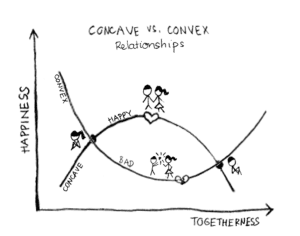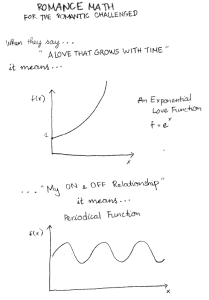Relationships
“There is an eloquent tale about the difference between Heaven and Hell. It is said that in both places, the occupants are presented with opulent tables laden with exotic foods and given four-foot long utensils with which to eat. In Hell, people are miserable and starving because they cannot imagine how to get food to their mouths with such long forks. In Heaven, the people are joyful and well fed. They use the same forks to feed each other.”- Leo Buscaglia’s “Love Cookbook”
In the United States and other Western countries, we’ve had a certain way of thinking about romantic relationships the past 150 years or so that seems to have locked us into certain roles and expectations that aren’t always constructive or useful any more.
Maybe it’s time to think of romantic relationships in some other way. In an era when women and men are more economically equal than ever, when more women graduate from college than men, and where, with some significant caveats, people have more opportunities to do what they want in making a living and a life, maybe it’s time to think about rejiggering our expectations for romance too.
One useful model, if an imperfect one, is to think about a romantic relationship the way we think of a business relationship. In a business relationship, both sides have an expectation of giving, and getting, relatively equal value and contributions to the proceedings. That’s a pretty good start on building a romantic relationship too, I’d suggest.
First, let’s get some nearly serious business (re)definitions out of the way:
Profit: A visionary who predicts we’ll be great together because we complement each other’s strengths and counter each other’s weaknesses. A true profit is too seldom honored in its own time.
Net Income: The happiness left over in a relationship after we’ve covered our bills, shared memorable experiences and lived our lives together. Barring extraordinary stresses such as serious illness or extended job loss, net income should normally be a positive number.
Accretive Value: Assessment of net income after cost, travel time and hassles of vacationing together on a small Greek island, instead of just driving up the coast to stay at that cute little B&B like my mother said we should do.
Revenue target/quota: The minimum contribution from each person in a relationship necessary to ensure resources, time and money isn’t an issue. This may range from quite a large contribution by one person to none at all from another. An individual’s revenue target may depend on their other contributions to the relationship, their own needs and the potentially wildly differing expectations by both themselves and their companion. Actual relation to reality in the setting of such targets for self and companion also may vary wildly.
Gross margin: The difference between what is revolting to a finicky lover (a Felix) and what is similarly disturbing to their clueless, indifferent or less discriminating companion (an Oscar). In many mismatched (and often short-lived) relationships, gross margin may be measured in multiple Grand Canyons.
Statement of Cash Flows: How much love, capacity, affection, giving, sharing, and trusting grows in excess of relationship minimums. These assets roll over into the next “billing period” like cell phone minutes, but can be spent down through mistakes, indifference, thoughtlessness, broken promises, failed expectations and little tiffs.
Balance sheet/s: An accounting of who got the best pillow and most of the comforter on a chilly night. Does it balance out? Is this a turnaround, a stable operation, or simply insolvent?
This romance math blog shares some wonderful additions.
Yet a real, grownup, romantic relationship is about more than this sort of transactional interaction. Both sides need to contribute an array of assets to the relationship if it’s to be something real and sustainable.
Simply put, you should give as good as you get in a relationship, though what assets you’re bringing can be of many kinds, far beyond just charisma, looks, or money. Both sides need to pull their weight. For me, someone pulling their weight can mean as simple as a smile to see, a hug to have, a special 5 minutes of peace that doesnt exist in my war of daily work.
The person we settle in with, ideally, is someone who covers our blind spots, balances our personalities and generally drives increased value to our committed partnership.
Relationships are effectively a contract (and explicitly so in the case of marriage). They are deeply complicated with emotions, preconceptions, expectations and pressures (biological, financial and otherwise).
“It is possible to give without loving, but it is impossible to love without giving— Richard Braunstein
My brilliant, matter-of-fact friend William Quigley took this even further, suggesting that couples getting married should prove they understand that their union involves a business principles and contractual obligations well beyond some transitory romantic impulse. William would require couples to sign a disclosure statement that outlines some of the less-excellent aspects of getting married in California (mostly having to do with what happens if you divorce in California).
In a similar vein, Mexico may impose a time limit on marriages. If you still like each other at the expiration date, you can re-up. If not, things are over and it’s no blood, no foul.
Writer Susan Pease Gadoua notes that too often, we don’t ask why people marry. People seldom ponder that important question before they walk down the aisle, especially with a marriage doomed to last only a few years if there’s no effort to save it.
In the equations of love and life, we should be seeking, even demanding, multiplication rather than simple addition to our lives? A person can add value to a relationship in lots of ways.
It might be by finding wonderful things to do or introducing new friends or business contacts. Maybe one person manages the home, makes the plans or otherwise reduces the joint time or cost of living. You can open your lover’s eyes to wonderment, encourage them to stretch and experience something new, work out more, or consistently bring sunshine into their lover’s day.
I’m pretty sure the secret isn’t quite encapsulated in this song. But I do think that, whatever it is you do, if you’re in a relationship, you should be trying to create new and exciting things for us to do, to be, to have. We have to make each other better with the resources we each have.
But, and this pains me to say, too many people I know don’t understand the need to balance out your side of the relationship. If they’re good bright or pretty and present, some seem to think that’s enough. But is that all you’ve got? I love courting, yet, when the linkage happens, are we truly driving each other’s triple bottom line in a sustainable, mutually rewarding relationship? Or are there contentious challenges on a second by second timeframe?
My expectations were set sky high by my amazing Mom and Dad, who have had very traditional roles, but put each other on a pillar of mutual love and respect. Mom makes everything perfect for dad, and vice versa. 50 years. A perfection of love, trust and respect.
But finding a balanced relationship like that is challenging. Some people are used to having others take care of them, no matter what they bring to a relationship. I can be generous even to a fault. It makes me happy to buy dinner for someone I care about, male or female. Want to repay me? Share a song or a story about a bottle of wine or a faraway land. Make it easy for me to take the little time I have to share with my otherwise chaotic life.
I once dated someone far wealthier, wittier and worldlier than I. It wasn’t easy keeping up, so I didn’t. Instead, I worked overtime to hold up my end, getting us access to cool stuff, interesting wines and fascinating people. Generally, I focused on easing her load, trying to pick up my part of the “tab” of our relationship.
But when the roles have been reversed with others, it seems few will make a similar effort to pick up their share of that metaphorical tab. Some of these people don’t even say “thank you.” What’s that about? Do these people make sure they are evening up the score with those around them? Can they afford to share the bill or was their time bought in some other fashion?
“The greatest good you can do for another is not just to share your riches but to reveal to him his own. “~ Benjamin Disraeli
Do you take your chosen one for granted? Do you contribute in various ways to the best of your ability? And when the roles are reversed, as happens so often these days, are you in parity with your partner?
So, are you adding or subtracting? Are you taking energy, or are you building up your lover, to be better, stronger, happier, healthier, wealthier, more than they were before? If you’re subtracting, or even just keeping that basic mathematical equation at a mere 1+1=2, then why are you together?
Really, if your us doesn’t equal more than you two separately,
it just doesn’t add up.
“Whoever loves becomes humble. Those who love have, so to speak, pawned a part of their narcissism.”– Sigmund Freud
 Written in 2010
Written in 2010












i am confused.. are you talking love or business?
the interrelationship.